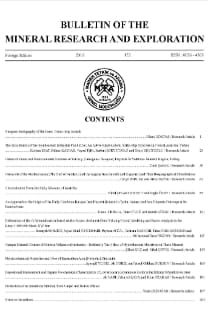TÜRKİYE'NİN GÜNEYBATISINDAKİ (ORTA TOROSLAR) ALLOKTON GÜMÜŞLÜ BİRİMİNDE BULUNAN ALT JURA RADYOLERLERİ
TÜRKİYE, ORTA TOROSLAR, ALLOKTON GÜMÜŞLÜ
LOWER JURASSIC RADIOLARIA FROM THE GÜMÜŞLÜ ALLOCHTON OF SOUTHWESTERN TURKEY (TAURIDES OCCIDENTALES)
___
- Brown, A. S., 1968, Geology of the Queen Charlotte Islands, British Columbia: Department of Mines and Petrol. Resources.
- De Wever, P.; Sanfilippo, A.; Riedel, W.R., and Gruber, B., 1979, Triassic radiolarians from Greece, Sicily, and Turkey: Micropaleontology, 24 pis. 1-7 (in press).
- Dumitrica, P., 1970, Cryptocephalic and cryptothoracic Nassellaria in some Mesozoic deposits in Romania: Revue Roumaine de Geologie, Geophysique et Geographie, Serie de Geologie, 14, 1, 45-124, pls. 1-21.
- , 1978, Family Eptingiidae, n. fam., extinct Nassellaria (Radiolaria) with sagital ring: Dari de seama ale sedintelor Institului de Geologie si Geofizica (D.S. Inst. Geol. Geofiz.), LXlV, pt. 3 (in press).
- Ehrenberg, C. G., 1847, Ubet eine halibiolithische, von Herrn R.Schomburgk entdecke, vorherrschend aus mikroskopischen polycystinen gebildete, Gerbirgemasse von Barbados: Monatber. Kgl. Preuss. Akad. Wiss. Berlin, 382-385.
- , 1875, Fortsetzung der microgelogische Studien als Gesammt-Uebersicht Gebirgsarten der Erde, mit specieller Rucksicht auf den Polycystinen-Mergel von Barbados: Abh. Kgl. Akad. Wiss. Berlin, 1-226, pls. 1-30.
- Foreman, H. P., 1968, Upper Maestrichtian Radiolaria of California: Special Papers in Paleontology, 3, i-v, 1-82, pls. 1-98.
- , 1973, Radiolaria from DSDP Leg 20: In Hezeen, et al., Initial reports of the Deep Sea Drilling Project, 20, 249-305, pis. 1-16.
- , 1975, Radiolaria from the North Pacific, Deep Sea Drilling Project, Leg. 32. in Larson, R. L., et al., Initial reports of the Deep Sea Drilling Project, vol .32 covering Leg 32 of the cruises of the Drilling Vessel Glomar Challenger, 579-676, pls. 1A-F; 2A-2L, 3-9.
- Frebold, H., 1970, Pliensbachian Ammonoids from British Columbia and southern Yukon: Canadian Journal of Earth Sciences, 7, 435-456.
- Haeckel, E., 1862, Die Radiolarien (Rzhizopoda Radiolaria): Ein Monographie (Reimer, Berlin), 1-572, pls. 1-35.
- — 1881, Entwwrf eines radiolarien-Systems auf grund von studien der Challenger-Radiolarien: Jena. A. Med. Naturwiss, 15, n. ser. 8 (3), 418-472.
- —— 1887, Report on the Radiolaria collected by the H.M.S. Challenger during the years 1873-1876: Rept Voyage Challenger, ZooL, 18, p. i-cxxxvii, 1-1893, pls. 1-140, 1 map.
- Imlay, R. W., 1968, Lower Jurassic (Pliensbachian and Toarcian) Ammonites from eastern Oregon and California: U.S. Geological Survey Professional Paper 593-C, C1-C51, pls. 1-9.
- International Code of Zoological Nomenclature (Adopted by the 15th Internal. Congress of Zoology), 1964,1-176.
- Irwin, W. P.; Jones, D. L. and Pessagno, E.A., Jr., 1977, Significance of Mesozoic radiolarians from the preNevadan rocks of the southern Klamath Mountains, California: Geology, 5, 557-562.
- Jones, D.L.; Silverling, N. J. and Hillhouse, J., 1977, Wrangellia-A displaced terrane in northwestern North America: Canadian Journal of Earth Sciences, 14, 11, 2565-2577.
- Kozur H. and Mostler, H., 1972, Beitrage zur enforaschung der Mesozoischen Radiolarien. Teil I: Revision der Oberfamilie Coccodiscacea
- Haeckel, 1862, emend, und Beschreibung iher Triassichen Vertreter: Geol. Palaont.Mitt. Insbruck, 2, 1-60, pls. 1-4.
- Mclaughlin, R. J. and Pessagno, E. A., Jr., 1978, Significance of age relations above and below Upper Jurassic ophiolite in the Geysers-Clear Lake Region, California. Jour. Research: U.S. Geol. Survey, 6, 6, 715-726.
- Neviani, A., 1900, Supplemento alla fauna a Radiolari delle rocce Mesozoiche del Bolognese: Soc. Geol. Ital., Boll., 19, 645-670.
- Pessagno, E. A., Jr., 1971, Jurassic and Cretaceous Hagiastridae from the Blake-Bahama Basin (Site 5A, JOIDES Leg. I) and the Great Valley Sequence, California Coast Ranges: Bulls. Amer. Paleon., 60, 264, 1-80, pls. 1-19, text-figs. 1-5.
- Pessagno, E. A., Jr., 1973, Upper Cretaceous Spumellariina from the Great Valley sequence, California Coast Ranges: Bulls. Amer. Pal., 63, 276, 49-102, pls. 9-21.
- , 1976, Radiolarian zonation and stratigraphy of the Upper Cretaceous portion of the Great Valley sequence, California Coast Ranges: Micropaleontology Special Paper, 2, 1-95, 14 pls. 10 text-figs.
- , 1977a, Upper Jurassic Radiolaria and radiolarian biostratigraphy of the California Coast Ranges: Micropaleontology, 23, 56-113, pls. 1-12, text-figs. 1-4.
- , 1977b, Lower Cretaceous radiolarian biostratigraphy of the Great Valley Sequence and Franciscan Complex, California Coast Ranges: Cushman Foundation for Foraminiferal Research, Special Publication, 15, 1-86, pls. 1-12.
- , 1979, in Pessagno, Finch, and Abbott (1979), Systematic Paleontology.
- ; Finch, J. W. and Abbott, Patrick L., 1979, Upper Triassic Radiolaria from the San Hipolito Formation, Baja California: Micropaleontology, 76 p. (ms.), 9 pls. 6 text-figs., (in press).
- and Newport, R. L., 1972, A technique for extracting Radiolaria from radiolarian cherts: Micropaleontology, 18, 2, 231-234, pl. 1.
- Poisson, A., 1977, Recherches geologiques dans les Taurides occidentalcs (Turquie): Thesis Universite Paris Sud Orsay France, 796.
- Riedel, W. R., 1967, in The Fossil Record: A symposium with documentation: Chapter 8 (Protozoa), 291-298.
- and Sanfilippo, A., 1974, Radiolaria from the southern Indian Ocean. DSDP Leg. 26. in Davies, T.A.
- et al., Initial reports of the Deep Sea Drilling Project, 26, 771-813, pls. 1-15.
- Rüst, E., 1885, Beitrage zur Kenntniss der fossilen Radiolarian aus Gesteinen des Jura: Paleontographica, 31 (ser. 3, v. 7) 269-321, pls. 26-45.
- , 1898, Beitrage zur Kenntniss der fossilen Radiolarien aus Gesteinen des Jura und der Kreide: Palaeontographica, 45, 1-67, pls. 1-19.
- ISSN: 0026-4563
- Yayın Aralığı: 3
- Başlangıç: 1950
- Yayıncı: Cahit DÖNMEZ
Sungu L. GÖKÇEN, Abdurrahim ŞAHBAZ
Can Jean AYDAR, François DUMONT
MİSEİA CİNSİNİN ÜÇ YENİ TÜRÜ VE RADİOLİTİDAE'NİN YENİ BİR ALT FAMİLYASI TEKLİFİ
Abdullah GEDİK, Taner SALTOĞLU, Hüseyin KAPLAN
XRF SPEKTROSKOPİSİ İLE DERE TORTULARINDA ZİRKONYUM TAYİNİ
Saim ÖZKÂR, Tanıl AKYÜZ, Ercan Alparslan ALPARSLAN, Macide TÜRKALP
GÜNEYBATI ANADOLU'DAKİ GRABENLERİN OLUŞUMU
Jean François DUMONT, Şükrü UYSAL, Şakir ŞİMŞEK, İ. Hakkı KARAMANDERESİ, Jean LETOUZEY
MADENBELENİTEPE (SOĞUKPINAR-BURSA) KALAY CEVHERLEŞMESİNİN MİNERALOJİSİ
Ahmet ÇAĞATAY, Yılmaz ALTUN, Bülent ARMAN
HATAY VE ELÂZIĞ BÖLGELERİNDE BULUNAN İKİ YENİ BORELİS TÜRÜNÜN TANIMLARI
